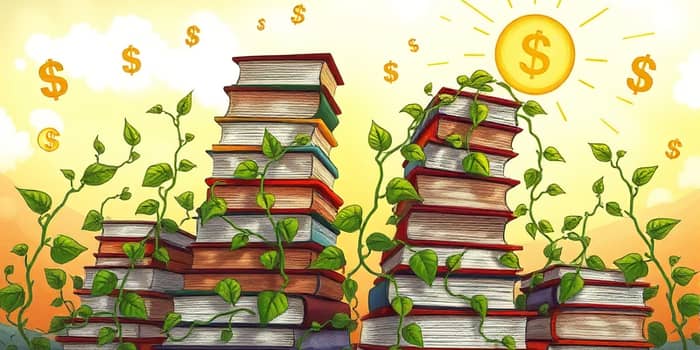The world of sustainable finance is growing rapidly as investors and institutions recognize the importance of aligning capital with environmental and social values. This article explores the most impactful books that have shaped the field, offering guidance for readers at every stage of their journey.
The Evolution of Sustainable Finance Literature
Sustainable finance has evolved from a niche interest to a mainstream imperative. Early works focused on basic principles, while modern texts integrate advanced strategies and global policy frameworks. Understanding this progression helps readers appreciate the depth and breadth of current discussions.
From ethical investment pioneers to cutting-edge research, each book contributes a unique perspective. Together, they form a rich tapestry of knowledge, reflecting how finance can drive positive change in the 21st century.
Foundational Texts for Beginners and Enthusiasts
For those new to the field, it’s crucial to build a solid understanding of the core concepts. The following books offer accessible introductions without sacrificing scholarly rigor.
- Sustainable Finance: Using the Power of Money to Change the World by Professor Molly Scott Cato offers a balanced overview grounded in real-world policy experience.
- Handbook on Sustainable Investments by Swiss Sustainable Finance provides a practical guide to developing organizational sustainability policies for financial institutions.
- Sustainability: A Comprehensive Foundation is an open textbook that merges economics, ethics, and engineering, ideal for students from diverse backgrounds.
These introductory texts emphasize how financial markets can support environmental stewardship and social equity. They lay the groundwork for deeper exploration of specialized topics.
Deep Dives: Comprehensive Volumes for Experts
Advanced readers and practitioners may seek exhaustive resources that cover historical context, theoretical underpinnings, and detailed case studies. One such monumental work is the Routledge Handbook of Social and Sustainable Finance edited by Othmar M. Lehner. At over 700 pages, it assembles chapters from leading experts, providing unparalleled depth on topics like green bonds, impact investing, and regulatory frameworks.
Another advanced volume, though not a traditional book, is various industry white papers and policy reports that compile cutting-edge research on sustainable financial instruments. These publications often explore innovative mechanisms such as blended finance, sustainability-linked loans, and emerging carbon markets.
Visionary Perspectives and Emerging Themes
Several recent works have challenged conventional finance paradigms by introducing transformative ideas. They inspire readers to rethink capitalism and embrace regenerative models.
- The Trillion Dollar Shift by Marga Hoek illustrates how sustainable enterprises can unlock massive economic opportunities by aligning with the UN’s Sustainable Development Goals.
- The Green Swans: The Coming Boom in Regenerative Capitalism by John Elkington presents a hopeful vision of exponential positive change through innovative business transformations.
- Green Giants: How Smart Companies Turn Sustainability into Billion-Dollar Businesses by E. Freya Williams analyzes nine corporate case studies to reveal the drivers of financially successful, socially responsible enterprises.
These books spotlight the intersection of profitability and purpose, demonstrating that environmental responsibility can coexist with—and even enhance—commercial success.
Trends Shaping Sustainable Finance in 2025
As we approach 2025, several trends are redefining the sustainable finance landscape. Global ESG assets under management are projected to surge, reflecting growing investor demand for aligned portfolios. At the same time, nature-positive finance initiatives are gaining prominence, aiming to restore ecosystems rather than merely protect them.
However, recent studies indicate some investors are recalibrating their ESG priorities, focusing more on financial returns while softening diversity, equity, and inclusion (DEI) commitments. Navigating these shifts requires both strategic foresight and ethical grounding.
Influential Authors and Their Legacies
Key figures have shaped the discourse and practice of sustainable finance through groundbreaking research and education programs.
- Dr. Carlos Vargas developed Harvard’s first sustainable finance curriculum and brought his insights to the University of Zurich, covering bonds, indices, and alternative assets.
- Alex Edmans, author of Grow the Pie, explores how companies can balance purpose with profit through stakeholder value creation.
- Larry E. Swedroe and Samuel C. Adams offer practical guidance in Your Essential Guide to Sustainable Investing, focusing on integrating ESG factors into portfolio construction.
These experts have not only written influential books but also shaped academic programs and industry standards, amplifying the impact of sustainable finance globally.
Putting Knowledge Into Practice: Case Studies and Applications
Translating theory into action is crucial. Case studies reveal how institutions implement sustainable finance strategies, from issuing green bonds to adopting rigorous ESG scoring systems.
For example, a major pension fund might allocate a portion of its portfolio to impact investments, driving social outcomes while achieving competitive returns. Likewise, corporate issuers are increasingly linking executive compensation to sustainability targets, embedding accountability directly into governance structures.
Policy frameworks at national and regional levels also play a pivotal role. Governments are introducing regulations that mandate climate risk disclosures and encourage capital flows into renewable energy projects. Practitioners must stay abreast of these developments to design compliant and effective financial instruments.
Academic Resources and Further Learning
Students and lifelong learners can benefit from freely available materials. The open textbook Sustainability: A Comprehensive Foundation integrates multiple disciplines, making it an ideal starting point for interdisciplinary studies. It examines the three pillars of sustainability—economic, social, and environmental—and explores their intersections.
Online platforms and university courses continue to expand their offerings, with certifications in ESG analysis, green finance, and impact measurement. Engaging with these resources ensures that practitioners remain current in a field defined by rapid innovation.
The Future Outlook and Call to Action
The trajectory of sustainable finance is optimistic but demands active participation. Readers are encouraged to delve into these influential books, adopting best practices and contributing to the dialogue. By championing principled investment decisions and supporting groundbreaking research, individuals can help steer capital toward a more resilient and equitable future.
Embrace the knowledge contained in these texts, share insights with peers, and apply proven strategies within your organization. Together, we can transform finance into a force for lasting global prosperity and ecological harmony.
References
- https://bank.green/blog/top-10-sustainable-finance-books
- https://us.anteagroup.com/news-events/blog/our-10-must-read-esg-and-sustainability-books
- https://www.morningstar.com/personal-finance/sustainability-books-your-reading-list
- https://digitaldefynd.com/IQ/best-books-for-esg-sustainability/
- https://blogs.cfainstitute.org/investor/2022/07/01/book-review-your-essential-guide-to-sustainable-investing/
- https://sustainabilitymag.com/top10/top-10-trends-in-sustainable-finance-for-2025
- https://open.umn.edu/opentextbooks/textbooks/96
- https://www.morningstar.com/personal-finance/sustainability-books-your-summer-reading-list










